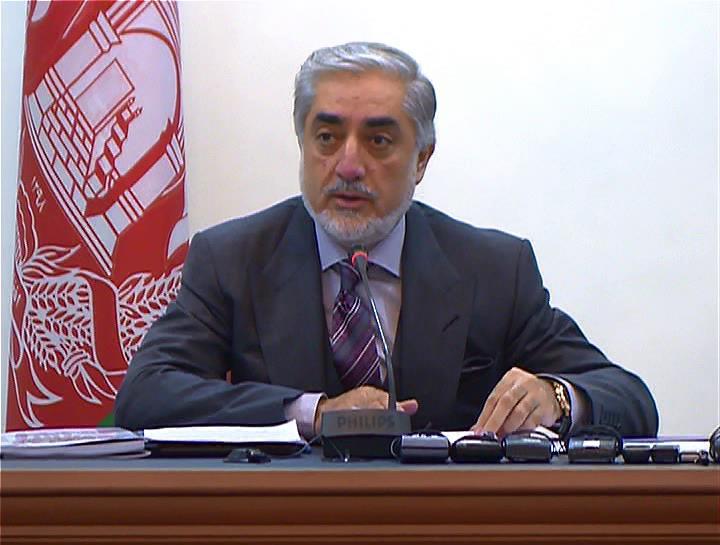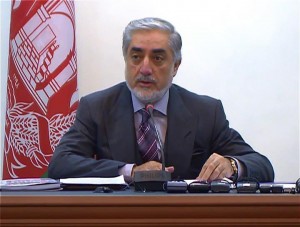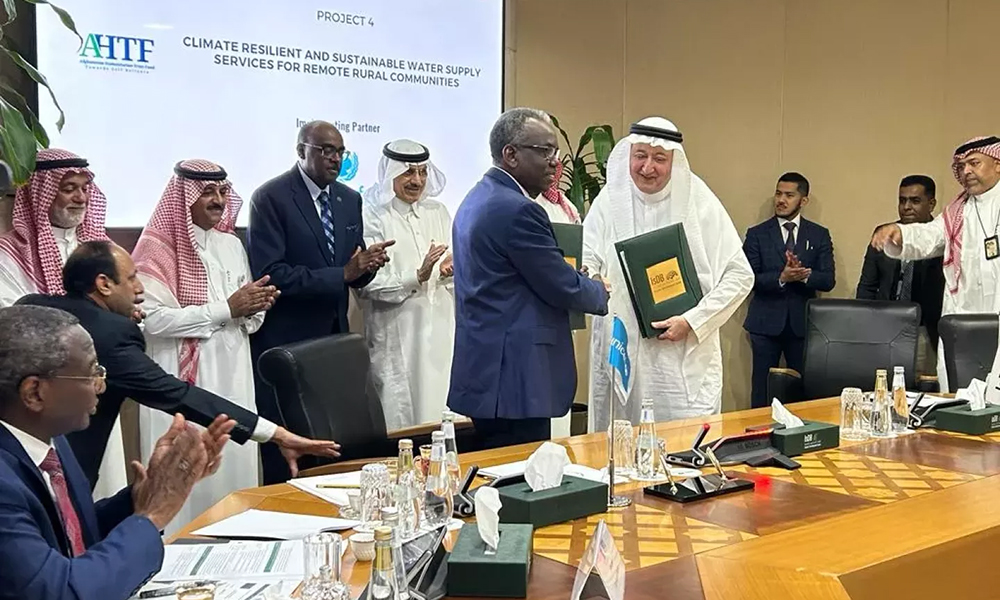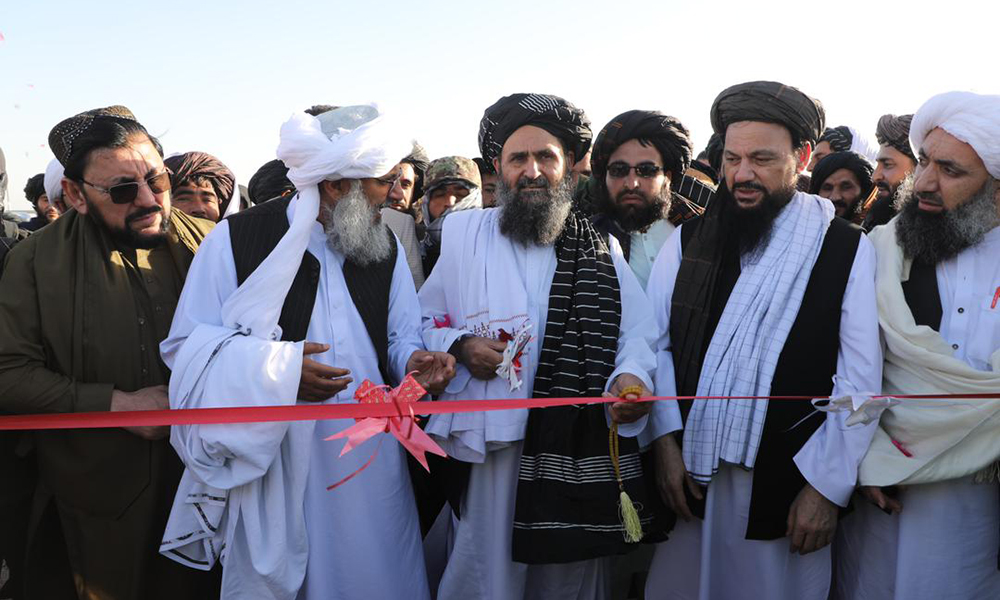Latest News
Afghan Gov’t plans to Reduce Level of Security Challenges

 The Chief Executive of the National Unity Government of Afghanistan said on Monday that a new security plan is underway to avoid civilian causalities, stabilize educational institutions and prevent kidnapping incidents.
The Chief Executive of the National Unity Government of Afghanistan said on Monday that a new security plan is underway to avoid civilian causalities, stabilize educational institutions and prevent kidnapping incidents.
“The minister of interior and deputy minister of defense should answer about martyr of our thirty citizens in Ghor province of Afghanistan and meanwhile they should also report about the dead of eight border soldiers,” CE Abdullah Abdullah said at the regular meeting of the council of ministers.
Only five days ago at least 30 civilians were killed by the anti-government militants in Firozkoh district of Ghor province in central Afghanistan.
Government officials said the killings were carried out by a former Taliban unit who had defected from that insurgent group and declared allegiance to the Islamic State. In a separate incident at least eight police officers were killed when militants attacked an outpost in Mohmand Dara district, located near the border with Pakistan, in the eastern province of Nangarhar.
Beside the Afghan security forces, the ongoing war in Afghanistan has affected civilians, governmental and non-governmental institutions including the schools and hospitals.
“People are worried about the kidnappings, schools are closed. All these issues must be prevented and there is a new plan underway,” Abdullah added in his remarks.
Politicians in the country say, the main reason behind insecurities and increased problems are the tensions between the government leaders and their incompetency.
Taliban militants have increased their attacks across the country especially in the southern and northern provinces and the issue of kidnapping have grown in many parts of the country.
Reported by: Ali Asghari

Latest News
Minister of mines says minerals must be processed in Afghanistan before exported

Acting Minister of Mines and Petroleum Shehabuddin Delawar has said in a meeting with officials of a Chinese company that the export of raw minerals for processing abroad is no longer allowed.
He said the ministry will work with foreign mining companies as long as they also process the minerals in Afghanistan.
Delawar said this during a meeting with China’s state-owned company MCC Holoda, and Chinese officials from the company contracted to extract copper from Mes Aynak.
The Ministry of Mines and Petroleum said in a statement that MCC Holoda is one of the largest mining and processing companies in China for copper, lead and zinc.
According to the statement, the company has expressed an interest in investing in copper, lead and zinc mines in Afghanistan.
Delawar welcomed their interest and said there are lead and zinc mines in Bamyan, Kandahar and Ghor provinces, and if the company agrees to process minerals inside Afghanistan, the ministry will cooperate with it.
Delawar also discussed the Mes Aynak copper project and called for acceleration of work at the mine.
Latest News
Afghanistan Humanitarian Trust Fund report highlights problems tackled

Mohammad Jamal Alsaati, Special Advisor to IsDB President and IsDB Coordinator for Afghanistan Humanitarian Trust Fund (AHTF), said this week that 14 projects, signed in 2023, have materialized at a total cost of $35.35 million.
He said in a statement issued Sunday that of this, $24.14 was from contributions from AHTF with a further $12.21 million provided by implementing partners and other international organizations.
Alsaati said all the services provided have created job and capacity building opportunities for the people of Afghanistan and that as of March 2024, pledges to the fund totaled almost $35 million, with more funding expected.
Alsaati’s comments were in a statement issued by the Islamic Development Bank, (IsDB), after it released the first comprehensive report on the achievements of the AHTF.
The report highlights the coordinated efforts by the IsDB, its partners, and stakeholders towards “Promoting Self Reliance and Resilience” in Afghanistan.
The AHTF’s mission is to provide initial humanitarian aid but then to prioritize development and self-reliance to move beyond emergency assistance – promoting reconstruction, empowerment and sustainable development.
IsDB President and Group Chairman, Muhammad Al Jasser meanwhile said following the release of the report that after receiving generous contributions, the AHTF “sprung into action, delivering essential aid to Afghanistan’s most vulnerable communities.”
He said the fund was able to tackle food insecurity, offer child nutrition programs, provide healthcare, innovative education, clean water, sanitation and hygiene services.
“Our projects are making a tangible difference on the ground,” Jasser said.
The Secretary General of the Organization of Islamic Cooperation (OIC), Hissein Brahim Taha also reacted to the report and said: “We are very pleased to see several humanitarian and development-focused projects are underway in Afghanistan – driven by the IsDB in collaboration with its regional and global partners.
“But much work still lies ahead, so we look forward to further help and support from our Member States, in addition to continued financial assistance for the AHTF from international aid and relief agencies,” said Taha.
The fund was established at a Council of Foreign Ministers of the OIC on 19th December 2021.
Latest News
Baradar visits Pashdan Dam, as work on project resumes

Mullah Abdul Ghani Baradar, deputy prime minister for economic affairs, has said the Pashdan Dam in Herat province is a key national project that the Islamic Emirate is committed to completing as soon as possible.
Speaking at an event marking the resumption of construction on this hydroelectric dam, which was started more than 10 years ago, Baradar said building dams was a priority for the Islamic Emirate.
Once complete the Pashdam Dam will not only generate electricity but also irrigate about 65,000 hectares of agricultural land, in turn providing work to thousands of people.
The dam will cost an estimated $117 million once finished and according to officials, at least 85% of work has been completed.
Officials expect the dam to be operational by the end of this solar year.
The construction of Pashdan Dam is being carried out by a domestic company in cooperation with an Azerbaijani company.
Engineers said the dam will mostly be used for agriculture purposes and for potable water. They also said about 73 kms of canals will be built to irrigate land.
This dam will store 54 million cubic meters of water. Currently, about 400 people are employed to work on the project.
-

 Sport4 days ago
Sport4 days agoAfghanistan beat Iraq 5-3, inch closer to Futsal World Cup berth
-

 Regional5 days ago
Regional5 days agoTurkey accuses U.S. of double standards over Gaza in rights report
-

 Regional4 days ago
Regional4 days agoNew UK sanctions target Iranian drone industry
-

 Latest News4 days ago
Latest News4 days agoEU allocates 17 million euros to support Afghans on the move
-

 Latest News3 days ago
Latest News3 days agoPakistan extends registered Afghan refugees’ stay till June 30
-

 World4 days ago
World4 days agoUS student protests over Gaza intensify despite arrests
-

 Regional3 days ago
Regional3 days agoChina to host Hamas, Fatah for Palestinian unity talks
-

 Sport2 days ago
Sport2 days agoAfghanistan qualify for FIFA Futsal World Cup for first time ever














